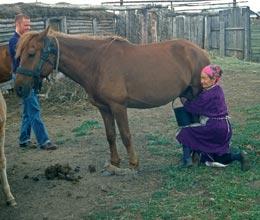Evidence
for ancient horse ranch uncovered
Traces of earliest known milking of horses in Kazakhstan.
Roberta
Kwok

Mares
are still milked some parts of Kazakhstan.A Outram
Humans rode and milked horses as early as 3500 BC, say an international
group of researchers. The findings come from ancient settlements
in Kazakhstan, where horse jawbones showed signs of bridling and
ceramic cooking vessels contained traces of horse milk. Researchers
also found that the horses' leg bones resembled those of domestic
rather than wild horses.
The
discovery of horse milk is "just amazing", says David
Anthony, an archaeologist at Hartwick College in Oneonta, New
York. Combined with previous findings that people discarded horse
manure at those sites, he says, it "is pretty unequivocal
evidence for domestication".
Scientists
have long debated when humans first domesticated horses. Indirect
clues, such as horse bones buried with other domesticated animals
in human graves, go as far back as 4500 BC. Horses also show shifts
in body size range from around 2500 BC, but the changes are not
as dramatic as those in other domesticated animals. More definitive
evidence emerges at roughly 2000 BC, when horses were buried with
chariots.
Settlements
of the Botai culture in northern Kazakhstan, dated around 3500
BC, have attracted attention because they contain masses of discarded
horse bones that far outnumber remains from other animals, as
well as tools that may have been used for processing hides. But
some scientists have argued that the mix of ages among the killed
horses suggests the Botai were hunting wild herds rather than
raising and slaughtering their own horses.
Demonstrating
domestication
Alan Outram, an archaeologist at the University of Exeter, UK,
and his colleagues took a three-pronged approach to investigate
the possibility of Botai horse domestication. First, they looked
at the lower leg bones of Botai horses, and found that they were
more slender than the bones of Palaeolithic Siberian wild horses.
Instead, the bones resembled those of Bronze Age domestic horses
and modern domestic Mongolian horses. Studying the teeth and jawbones
of the horses, they also detected tooth wear and extra jawbone
growth, suggesting the animals' mouths had been damaged by bridling.
Finally, the team analysed the hydrogen isotope ratios of fat
residue in pottery shards and found two distinct signatures that
seemed to correspond to horse carcass fat and mare's milk.
"We've
not just got domestic horses — we've got domestic horses
that seem to have been ridden and milked," says Outram. The
findings appear in Science1.
The
study suggests the Botai culture was a distinct centre of domestication,
separate from the 'Fertile Crescent' area, between the Mediterranean
Sea and the Gulf, where cattle, sheep and goats were first domesticated,
says Outram. The findings are unusual, he says, because animal
domestication typically occurs in cultures that have adopted agriculture,
whereas the Botai were hunter-gatherers.
Further
back in time
Although the milk evidence is convincing, the leg bone and bridling
analyses are less definitive, says Anthony. Horses naturally vary
in size across different regions, he says, so the leg differences
may not necessarily be due to domestication. Anthony also notes
that the methods used to analyse tooth and jaw damage are preliminary
and will need to be confirmed by others.
It
is possible that horses were domesticated even earlier than 3500
BC, says Carles Vilà, an evolutionary biologist at the
Spanish National Research Council's Doñana Biological Station
in Seville. "The study is showing that by that time, [the
horses] were already modified," he says.
Outram's
team plans to perform further excavations on Botai sites to look
for features related to corrals. They may also investigate sites
in Russia to look for earlier evidence of horse domestication.
References
Outram, A. K. et al. Science 323, 1332–1335 (2009). |
Article | ChemPort
|